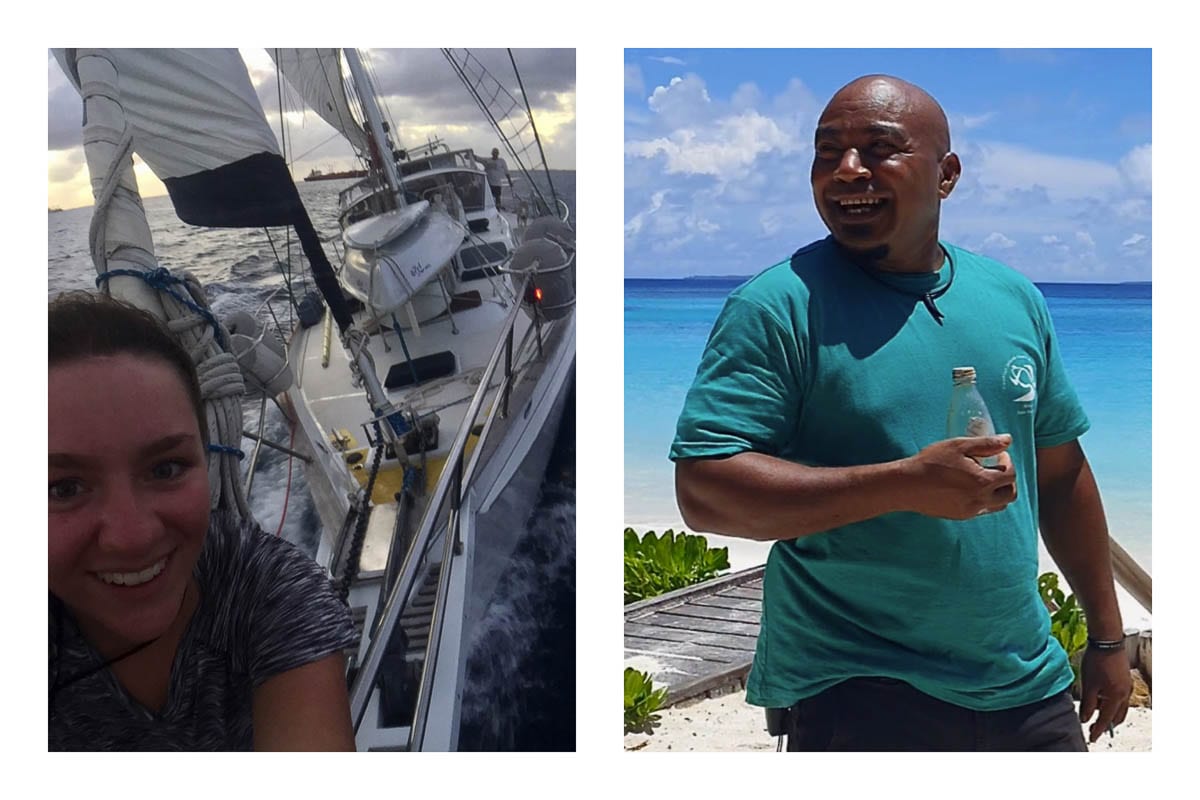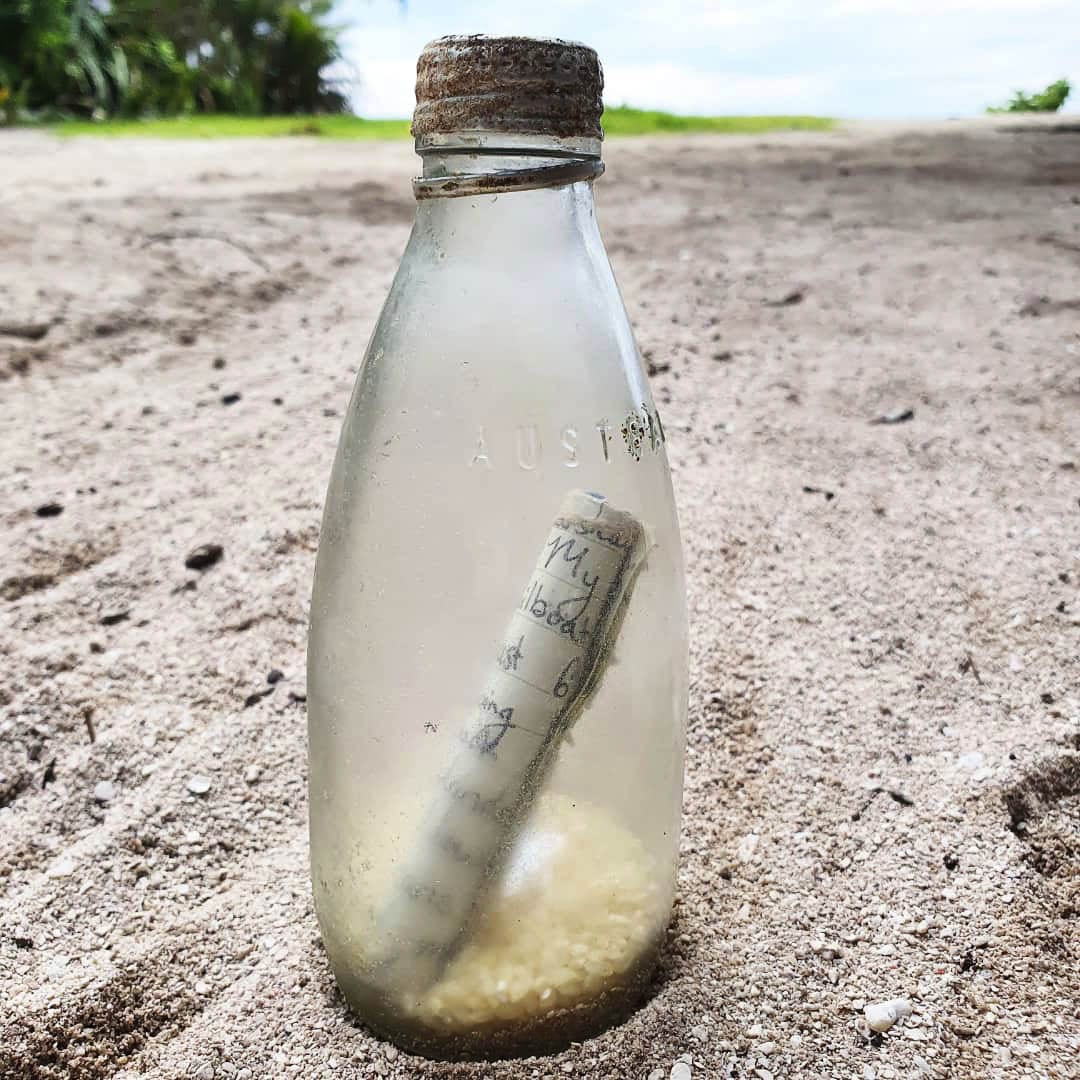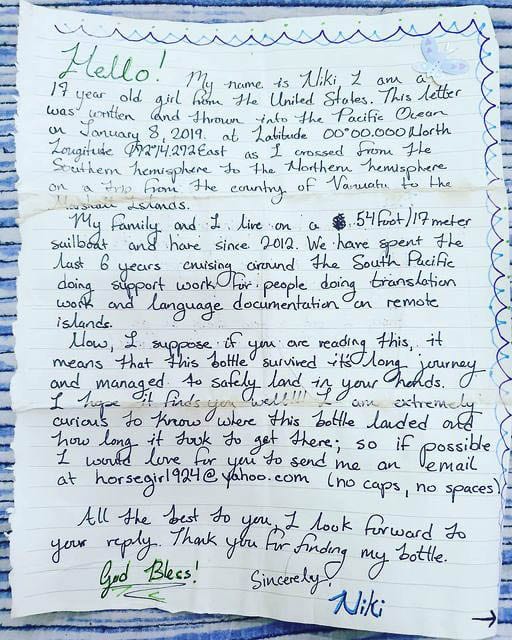Battle Ground missionary’s floating letter is found in Papua New Guinea
BATTLE GROUND — When Niki and her friend crossed the equator in the center of the Pacific Ocean they didn’t think that single moment would bring joy to so many people.
Together, they wrote letters to whoever would find them, sealed them in glass bottles and tossed them into the water. As they drifted away, the 60-foot-sailboat carried its passengers out of the South Pacific, and closer to home in Battle Ground.
“We thought, ‘Hey, we have never thrown a message in a bottle over, why not?’” Niki said.
They were returning with Niki’s family from the many islands that surround Papua New Guinea (PNG), where Niki and her family had just spent six years serving as missionaries. Now, more than two years after they returned to the states, Niki’s bottle washed up on the shores of the Conflict Islands in PNG.

Steven Amos is a native of the island of islands and a crew member at the Conflict Islands Conservation Initiative (CICI). Cleaning up trash on the beaches one day he found Niki’s message in a bottle. With the help of Project Manager Hayley Versace, the team found Niki through social media and an email she had written on the letter.
“I was just sitting there doing homework, and I saw this email, then I read it, and I went to the Facebook page,” Niki said. “And sure enough, about three days previous to me getting that email, they had done a Facebook post about the bottle and about trying to find the person who wrote it.”

Niki and Hayley connected shortly thereafter, and then last month Steven got to meet his USA penpal via Zoom. The crew at CICI has invited Niki and her family to come and visit the islands as soon as they are able to.
The story about the bottle has drawn unprecedented attention from around the globe to the work of CICI with saving endangered sea turtles and cleaning up plastic trash from the ocean and beaches.
“I came across this bottle washed up on our beach, and so what I did was to look for means and ways to find the owner of the message in a bottle,” Steven said. “The rubbish that has been disposed in the sea we are now facing it on our beaches. It’s not an overnight thing, it’s gonna take a while to do this. The best thing is we get in touch with people like you and others so this way we can bring this awareness around the world to help us do these jobs.”

Adventures of a lifetime
When Niki’s parents felt the call to go and serve as maritime safety instructors and missionaries in the South Pacific, Niki’s brother was ready for the adventure. She, however, was not so sure at first.
It would mean leaving everything familiar to spend years of her life on a boat, not to mention face the potential dangers of traversing the open ocean. Nevertheless, she came around and on her eleventh birthday, the family sailed down the Columbia River and out into the Pacific.
After reaching the ocean, the family sailed South down the coast to Mexico. This first leg of the trip was a trial run to see if the arrangement would even work for their family, Niki said. It did, and after reaching Mexico they made their longest open ocean crossing to Hawaii.
Once they reached the many islands that fill the South Pacific, the family began work in partnership with Wycliffe Bible Translators. Their job was to help improve safety conditions for local maritime transports. So many of the islands there are unreachable by plane and two remote for helicopters, so the bulk of people and goods are transported by boat.
“A lot of the vessels that are available are pretty unreliable, and incredibly unsafe; no extra fuel, no life jackets, no navigation equipment,” Niki said. “So it’s all just kind of like, ‘We’ll head this direction and hopefully find land.’ So a little bit more unpredictable. So we were down there, both providing that safe transportation and then also educating on it.”
The family had intended to work within a few areas specifically for a set period of time. Instead, they became an indispensable part of bringing translators and support teams, as well as their families, to the islands they would live on. They even helped them move in, and do construction on their homes.
Many times they would have people live with them on their boat for weeks at a time. Traveling on the open water between islands, they often encountered bad weather that they had to preemptively navigate around.
“When we ended up getting down there, the plans kind of changed as they tend to do, God’s timing God’s plan,” Niki said. “We were hosting language documentation, and then scripture use teams or families on our boat, because they were transitioning out to their island village, they were having to work on their house, and they were having to install solar panels and figure out how they’re going to keep their food with no electricity. My dad and brother ended up helping do construction or fix things and whatever was necessary, while my mom and I would help host the kids or just to support the family.”
Niki’s parents are currently planning to return to the South Pacific with a larger vessel and continue the work of serving the people there.
“It just kind of helped me realize how unique of an opportunity it was,” Niki said of these past weeks. “It was just kind of working in the moment with what God had given us. That realization that no matter where you are, God is there working in you, through you, with you, through other people to you, just in everything.”
Preserving a natural paradise
In the Conflict Islands, CICI has welcomed the attention they have received from everyone from the BBC to Clark County Today. Before the pandemic, the organization worked with crews of volunteers to help restore the sea turtle population and clean up trash, as well as raise awareness of the effects plastics and chemicals have on places like PNG.
“So to me learning a lot from here, I want to become somebody, a leader in the future taking this back to my own people to show them or to teach them or to work with them about what I’m doing now,” Steven said. “I’m so thankful to have been working here.”
Since 2017, CICI has helped bring the turtle population back to normal through nurseries and by releasing newly raised turtles back into the ocean. They also mitigate predation, poaching and pollution, which are three main threats to sea turtles.
Just before the pandemic began, the organization was set to expand its resources into a coral reef program. This is a large step forward, as many of the islands in the South Pacific have coral foundations and ecosystems completely reliant on the reefs.
COVID-19 has halted many of the teams who would normally partner with CICI, and the added awareness from finding Niki’s bottle, has given the crew renewed encouragement for their efforts.
“It’s kind of reassuring to know the work that we are doing is getting some attention and the spaces that we’re trying to highlight, they are getting more attention,” Hayley said. “It gives us sort of a little bit more hope that people are paying attention to what they’re doing in their daily lives, and especially around issues like plastic and climate change. In cities like where I’m from in Australia, you don’t really see it too much, but here, it affects basically every part of our everyday life.”
To learn more about CICI, you can check out their Facebook page here.




